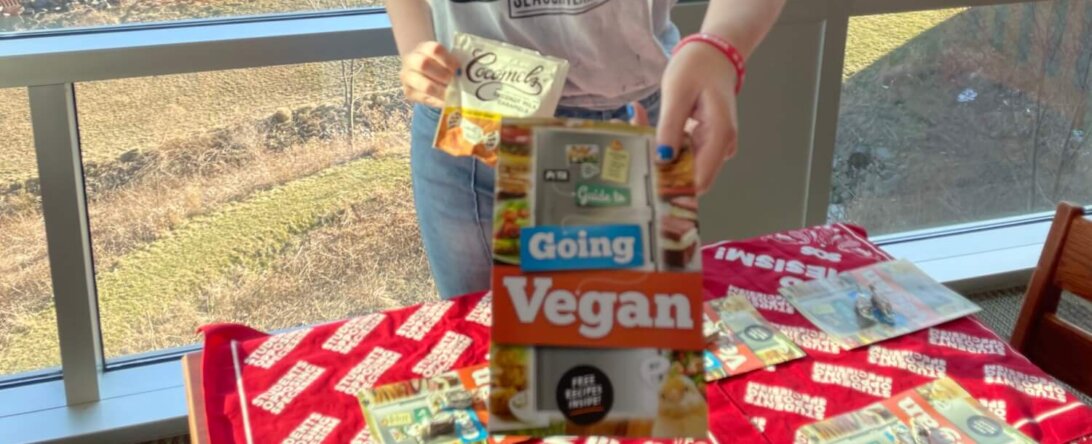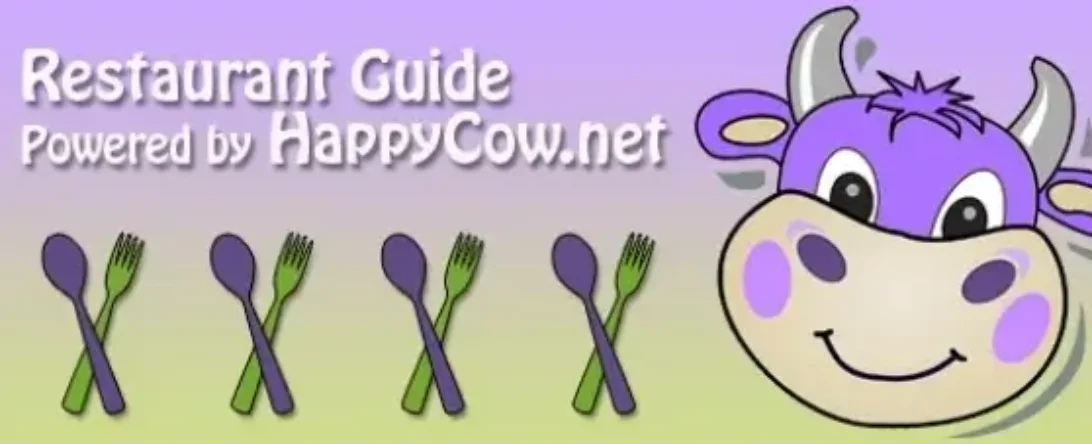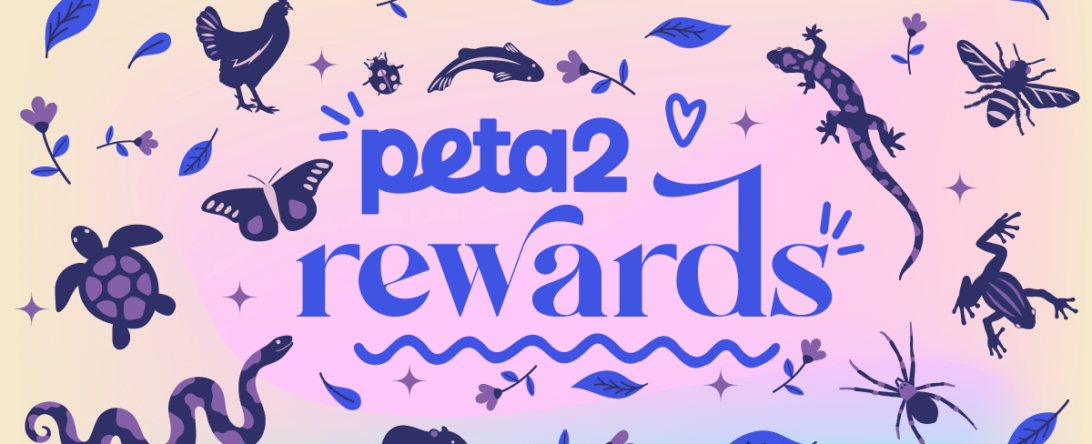FAQs About peta2 and Animal Rights
What’s the difference between peta2 and PETA?
The campaign goals are the same, but peta2 exists to reach young people with approachable, relatable content about animal rights and the vegan lifestyle. We believe that the best way to create lasting, long-term changes for animals is by making sure future generations understand that animals have the right not to be tested on, turned into a burger or a belt, or used for entertainment.
What is speciesism?
Speciesism is the belief that all other animal species are inferior to humans—even though, in the ways that matter most, we’re all the same. We all feel love, pain, joy, and fear, so all animals deserve equal consideration and deserve to be free from human exploitation. Animals are not ours to experiment on, eat, wear, use for entertainment, or abuse in any other way. Rejecting speciesism means taking an objective look at our personal choices and eliminating the ones that hurt animals.
What do you mean by “animal rights”?
Just like humans, animals have interests that can’t be given up or traded away for someone else’s benefit or convenience. However, this doesn’t mean that animals need to have all the same rights that humans do. For instance, a dog doesn’t have an interest in voting, so there’s no need for dogs to have the right to vote. We believe that animals are not ours to eat, wear, experiment on, use for entertainment, or exploit in any other way.
Animal rights vs. animal welfare: What’s the difference?
Animal welfare theories accept that animals have interests but allow these interests to be traded away as long as there are some human benefits that are thought to justify that sacrifice.
Animal rights proponents hold that animals, like humans, have interests that cannot be sacrificed or traded away just because it might benefit others. However, the animal rights position does not hold that rights are absolute—animals’ rights, just like those of humans, must be limited and can certainly conflict.
Animal rights means that animals are not ours to use for food, clothing, entertainment, or experimentation—while animal welfare allows animals to be used for these purposes as long as “humane” guidelines are followed.
What does “animal test–free” mean?
There’s no single globally accepted legal definition, but to peta2, it means that a company or brand doesn’t conduct, commission, or allow any tests on animals, including in its supply chain, anywhere in the world, for any reason. Our database of more than 6,000 companies and brands that don’t test on animals lists Dove, e.l.f., Herbal Essences, Florence by Mills, NYX, ColourPop, Method, and way, way more!
How can I go vegan if my parents don’t support it?
It can be a bummer if you’re psyched about going vegan but your parents are a little iffy about letting you make the switch. (“But where will you get your protein?!”) Be open and honest, and have your talking points ready. Discuss how going vegan is healthy, easy, cheap, and delicious and why it’s important to you. If your parents really can’t see things your way, stay strong. It’s OK to be different, especially when your difference means that you’re saving animals! Don’t worry about others’ opinions when you know you’re making a positive impact on animals, the Earth, and your own well-being.
My teacher is asking us to dissect animals. What do I do?
If you live in a state or a school district that has a dissection-choice policy in place, you can say NO to dissection and ask for an alternative assignment. If your teacher refuses to give you a humane alternative, this could be illegal! Check to see whether your state or school has a dissection-choice policy.
If you live in a state or district without a dissection-choice policy, have your parents call your school and ask that an alternative assignment be given to you. If that doesn’t work, e-mail [email protected] for help.
Which type of animal is abused the most?
Chickens are the most-abused land animals in the U.S. Every year, 9 billion chickens used for meat are crammed together into huge filthy sheds and bred to grow so large so quickly that their joints and internal organs often can’t keep up, causing painful leg problems and organ failure. After only six to seven weeks, their throats are slit and they’re dragged through scalding-hot water, often while still conscious. In addition, millions of chickens suffer in the egg industry. They’re confined to severely crowded cages and forced to lay more eggs than their bodies can handle. After their production declines, they’re slaughtered. Even though almost 100 times as many chickens are slaughtered than pigs and more than 200 times as many chickens are slaughtered than cows, birds are excluded from the Humane Methods of Slaughter Act—so practices that would be illegal if used on pigs or cows are legally used on chickens and turkeys. Chickens are the most-abused animals because there are no laws to prevent the cruelty that’s inflicted on them and because people eat a lot more chickens than pigs or cows. (Just think: Every chicken only has two legs and two wings. Can you image how many birds are slaughtered for just one “wing night”?) Learn more about how to help chickens here.
What’s wrong with drinking dairy milk? Don’t cows need to be milked?
In order for a cow to produce milk, she must have a calf. Cows in the dairy industry are impregnated every year in order to keep up a steady supply of milk. In the natural order of things, the cow’s calf would drink her milk (eliminating her “need” to milked by humans). But mother cows’ babies are taken away within a day or two of birth so that humans can have the milk that nature intended for their calves. The current high demand for dairy requires that cows be pushed far beyond their natural physical limits, genetically engineered, and fed growth hormones in order to produce huge quantities of milk. Even the few farmers who choose not to raise animals intensively both eliminate the calf (who would otherwise drink the milk) and send the mother to an early death when her milk production wanes.
Does peta2 support any political party or endorse any political candidates?
peta2 is nonpartisan. As a 501(c)(3) nonprofit educational organization, we’re prohibited by IRS regulations from endorsing a particular candidate or party. We do, however, work with legislators of all party affiliations and recognize the accomplishments of politicians who have helped pass laws protecting animals, regardless of their party.
The only meat I still eat is fish. Can fish feel pain?
Research has shown that they can. According to Dr. Donald Broom, animal welfare advisor to the British government, “Anatomically, physiologically, and biologically, the pain system in fish is virtually the same as in birds and mammals.” Fish have fully developed brains and nervous systems as well as very sensitive mouths. They use their tongues and mouths as humans might use their hands—to catch or gather food, build nests, and even hide their offspring from danger. They also experience fear. An Australian study found that when fish are chased, confined, or otherwise threatened, they react as humans do to stress: with increased heart and breathing rates and a burst of adrenalin.
I’m a student, and there are very few vegan options in my dining hall. Can you offer any advice?
When students at the University of California–Berkeley first met with the university’s dining hall service to discuss getting vegan options in their cafeteria, they received a lukewarm response. So they set up a table with petitions right outside the dining hall. Within two weeks, they had collected 1,200 signatures—more than one-fifth of the school’s dorm population! Their campaign also attracted the attention of local reporters. “The media attention really helped us press our case,” says Leor Jacobi, one of the students who spearheaded the project.
Just four weeks and many meetings later, the university’s administration agreed to provide a fully vegan entrée at every meal. The dining service kicked off day one with an all-vegan lunch, and students sampled meat-free chili, stir-fry, tofu kababs, hummus, rigatoni and beans, stew, and raspberry sorbet. “There was an overwhelmingly positive student response, even from those who hadn’t tried this way of eating before,” says Jacobi.
Click here to learn how to get vegan options in your school’s cafeteria.
What are the alternatives to animal testing?
Many humane research methods are available that are faster, more relevant to humans, and less expensive than tests on animals. Medical historians tell us that the majority of medical breakthroughs are the result of epidemiological studies, clinical (human) trials, and improvement in public hygiene and lifestyle changes—not animal tests. And 90% of basic research, most involving animals, never leads to treatments for humans. Cutting-edge, non-animal research methods—such as organs-on-chips, artificial intelligence, cell-based tests, and sophisticated computer-modeling techniques—along with studies of human populations and volunteers are faster and more accurate. International agencies, scientists, and professional organizations around the world endorse the use of these humane methods in place of cruel, archaic animal experiments.
My school is taking a field trip to a place that uses animals for entertainment. How can I stop this from happening?
Thanks for wanting to take action to help animals used for entertainment! As a student, you can make a huge difference by speaking up. You can share “The Kind Teacher’s Guide to School Field Trips and Fundraisers” with your teacher to discuss alternatives that are kind to animals, like visiting open-admission shelters, animal-free circuses, or nature reserves. E-mail us at [email protected] if you need more support.
I want to wear vegan clothing. Which fabrics should I look for?
Countless animals around the world are exploited in the name of fashion. They’re abused and killed for wool, fur, leather, cashmere, mohair, and angora. Thankfully, there are tons of humane clothing and accessory options, such as cotton, canvas, linen, polyester, and Tencel. There’s even a pineapple leather called Piñatex, and vegan wool can be made from recycled plastics these days!
Text peta2 to 30933 for ways to help animals, tips on compassionate living, and more!

Terms for automated texts/calls from peta2: http://peta.vg/txt. Text STOP to end, HELP for more info. Msg/data rates may apply. U.S. only.



